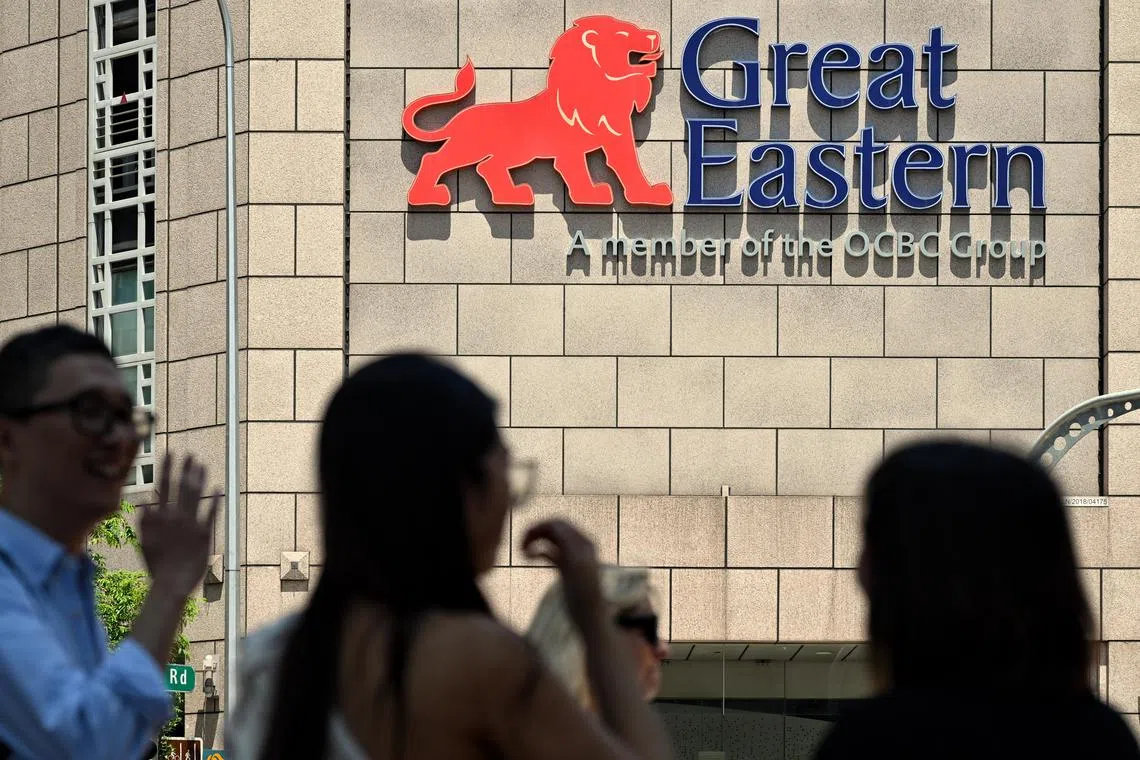EY says OCBC’s Great Eastern offer ‘not fair but reasonable’, advises that shareholders accept it
Sign up now: Get ST's newsletters delivered to your inbox

OCBC made a $1.4 billion bid on May 10 to take its insurance arm Great Eastern Holdings private following recent shareholder unhappiness over falling returns.
PHOTO: ST FILE
Follow topic:
SINGAPORE – OCBC’s offer to buy the remaining shares of Great Eastern Holdings (GEH) from minority investors is “not fair but reasonable”, said independent financial adviser Ernst & Young Corporate Finance on June 14.
In a separate statement, OCBC said its $25.60 per share offer price is final and will not be increased. The bank also extended the offer’s closing date from June 28 to July 12.
Its voluntary unconditional general offer was for the 11.56 per cent stake in GEH that it did not own.
The offer price represented a 36.9 per cent premium over GEH’s closing price of $18.70 on May 9.
However, it was also 30 per cent lower than GEH’s $36.59 per share embedded value as at the end of the insurer’s last financial year.
OCBC had received acceptances for 1.74 million GEH shares, or 0.37 per cent of the total, as at the end of June 13.
This raises the bank’s stake in GEH to 88.8 per cent, and to 89.01 per cent if the number of shares held by OCBC’s concert parties is included. A concert party refers to a group of investors who buy shares in the same company and then combine them to secure a takeover.
OCBC intends to delist GEH if the free float requirement of 10 per cent is not met, noted EY in a letter to independent directors that advised them on making recommendations to GEH shareholders.
If a delisting happens, GEH shareholders will continue to hold their shares but will no longer be able to trade them.
There is also little likelihood of competing offers, given OCBC’s 88.44 per cent holding of GEH, said EY, adding: “We note that there is no other general offer that will be capable of turning unconditional or succeeding.”
This, among other reasons, led EY to conclude that the bank’s offer is reasonable.
“Taking the factors we have considered, we advise the independent directors to recommend that shareholders accept the offer,” it said.
It advised the independent directors to consider highlighting to shareholders that the current share price – GEH shares closed at $26.10 on June 14 – appears to be supported by the offer. GEH shares’ current price and liquidity performance are not indicative of future performance, it said.
The adviser also detailed the factors it considered when it determined the fairness of the offer.
“The offer price of $25.60 per share is lower than the derived range of values for the shares,” said EY. “We have determined the range of values of the shares to be from approximately $28.87 per share to approximately $36.19 per share.”
It derived the price of $28.87 by applying the average price-to-embedded value (P/EV) ratio of comparable companies over the 10-year period to June 6. The price was adjusted for the dividend of 40 cents per share paid after May 10.
The 11 comparable companies included AIA, Manulife, Prudential and other insurers in Asia.
The $36.19 price was based on GEH’s reported embedded value as at Dec 31, and adjusted for the dividend.
Meanwhile, the price-to-net asset value ratio implied by the offer price is 1.5 times – lower than the average and median ratios of comparable transactions, which are around 1.8 times. “After having considered carefully the information, we are of the view that the offer is not fair,” said EY.
EY said the offer was reasonable because the 11.56 per cent of minority interests, even if they voted fully as one bloc, will “lack the authority to make management decisions, change key personnel or influence the business direction of the group without the support of the offeror”.
“While the offer price represents an implied discount of 30 per cent to the reported embedded value of the shares as at Dec 31, the shares had consistently traded below the embedded value per share since October 2019, up to the announcement date,” it added.
There has also been thin trading in GEH shares. EY noted that the average daily traded volume for the 10-year period preceding June 6 represented approximately 0.04 per cent of the free float.
GEH shares dipped 0.3 per cent to close at $26.10 on June 14, before the SGX filing that included EY’s letter.
Trading volumes have significantly increased following OCBC’s announcement on May 10, noted EY.
The average daily volume from May 10 to June 6 was approximately 0.66 per cent of the free float.
Compared with the liquidity of Straits Times Index (STI) constituents, EY said the shares’ average daily trading volume to the free float – 0.1 per cent – is within the range of the same metric for STI constituents, but below the average and median.
“Taking into account the liquidity analyses of the shares that have been performed, it would appear that the trading price of the shares may not be fully reflective of the value of the shares,” it said.
Former remisier Ong Chin Woo, who led a group of GEH minority shareholders who raised concerns over the insurer’s declining valuation, said: “We feel affirmed by the independent financial adviser’s statement that the offer is ‘not fair’.”
“We acknowledge OCBC’s right to maximise its self-interests within legal boundaries. However, we believe that, in accordance with principles of good corporate governance and leadership, OCBC could have done more for GEH minority shareholders, who are essentially its ‘junior partners’ in the insurance business,” he added.
He advised shareholders to carefully consider EY’s recommendations and to consult their brokers and financial advisers before making any decisions.
“Personally, I intend to retain some GEH shares as a commemoration of this significant journey we have walked together, even if GEH is delisted,” he said.


